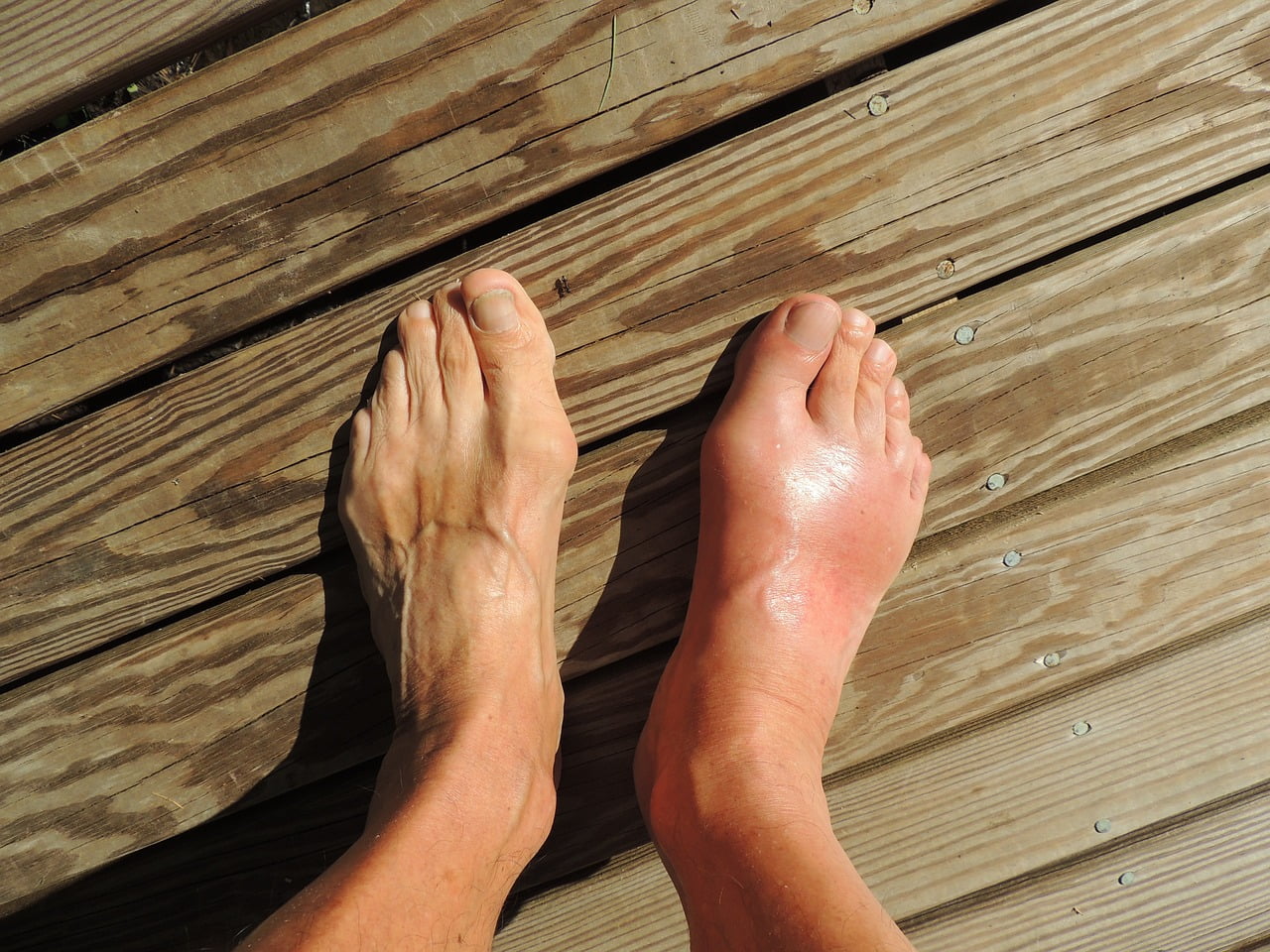Living with gout on top of foot can transform a simple necessity like sleeping into a nightly challenge, undermining our health and well-being. The sharp, burning pain that characterizes this condition often intensifies at night, leaving many of us tossing and turning in search of relief. Understanding the impact of gout on our sleep patterns is crucial, as consistently poor sleep can lead to a host of other health problems. Therefore, finding effective ways to manage this pain and improve sleep quality is not just beneficial; it’s essential.
In this article, we’ll explore several strategies to help manage gout pain and how to stop gout pain at night, aiming to restore the quality of sleep we deserve. From effective pain management techniques and preventative measures to ward off nighttime gout attacks, to tips for optimizing our sleep environment, we cover a range of interventions designed to tackle this issue head-on. Our goal is to provide a comprehensive guide that will not only ease the discomfort caused by gout on top of foot but also enhance overall sleep quality, allowing for a more restful and rejuvenating night.
How Gout Affects Your Sleep
The Link Between Gout and Sleep Disturbances
Gout significantly disrupts sleep due to the intense joint inflammation that often awakens individuals from a sound sleep. Research shows that gout attacks are 2.4 times more likely to occur at night . This is primarily because the tiny uric acid crystals that trigger gout form more readily overnight due to various physiological changes that occur while we sleep. For instance, our body temperature slightly drops, and our breathing patterns change, leading to an increase in blood acidity and a decrease in cortisone, which is crucial for suppressing inflammation .
Additionally, while we sleep, the body naturally dehydrates slightly, concentrating the uric acid in the blood and joint fluids. This dehydration, combined with decreased cortisone production and cooler body temperatures, creates an ideal environment for uric acid crystals to form in the joints, particularly in the cooler extremities like the big toe .
Common Symptoms of Gout at Night
The primary symptom of gout at night is a sudden, severe pain in the affected joint, most commonly the big toe. This pain is often described as throbbing and unbearable, making it difficult to find a comfortable sleeping position . The affected joint may also be so sensitive that even the slightest touch or movement can exacerbate the pain, further hindering sleep.
Moreover, gout can lead to other sleep disturbances. Individuals with gout are more likely to experience frequent awakenings and reduced sleep quality due to the pain. Additionally, conditions like sleep apnea are more prevalent among those with gout, complicating the picture further by disrupting normal breathing patterns, which can intensify the formation of uric acid crystals .
Managing these symptoms effectively is crucial for improving sleep quality and overall health, as poor sleep can exacerbate gout symptoms and lead to longer recovery times. Understanding these connections and implementing appropriate management strategies can significantly alleviate the impact of gout on sleep.
Effective Pain Management Techniques
Over-the-Counter Medications
We can find quick relief from gout pain using over-the-counter (OTC) medications, particularly nonsteroidal anti-inflammatory drugs (NSAIDs). Common choices like ibuprofen and naproxen are effective in reducing inflammation and pain when taken early during a gout attack. It’s crucial for us to administer these medications within the first 24 to 48 hours of symptom onset to maximize their effectiveness and potentially shorten the duration of the flare . However, we should be mindful not to exceed the recommended usage, typically not more than seven to ten days, to avoid adverse effects .
Home Remedies and Compresses
In addition to medication, several home remedies can help manage gout pain at night. Applying ice to the affected joint can significantly reduce swelling and alleviate pain. It’s recommended to wrap ice in a thin towel and apply it for 20 to 30 minutes several times a day . We can also use heat applications, like a warm shower or a heating pad, between attacks to soothe the joints .
Furthermore, dietary choices and supplements play a role in managing gout. Consuming cherries or cherry extracts, which are rich in antioxidants, can help reduce uric acid levels and prevent gout flares . Other beneficial supplements include bromelain, found in pineapples, and vitamin C, which has been shown to lower uric acid levels . It’s also helpful to stay hydrated and elevate the affected joint to reduce swelling .
By combining these medications and home remedies, we can effectively manage gout pain and improve our sleep quality, making those restless nights less frequent.
Preventative Measures for Nighttime Gout
Diet and Nutrition
Managing our diet is crucial in preventing nighttime gout flares. We should focus on consuming low-purine foods which help maintain uric acid at healthy levels. Incorporating foods like low-fat dairy products, pulses, and a variety of vegetables such as mushrooms, asparagus, and spinach is beneficial. Fruits, especially cherries and berries, are excellent as they are low in fructose and high in anti-inflammatory properties . Additionally, drinking plenty of water helps in reducing uric acid concentration by facilitating its excretion through urine.
It’s equally important to avoid foods high in purines. Red meats, organ meats, and certain seafood like mussels and scallops should be consumed in moderation or avoided. We must also limit or avoid alcohol and sugary drinks high in fructose, as these can increase uric acid levels .
Exercise and Weight Management
Regular physical activity is essential in managing gout. Engaging in low to moderate-intensity exercises such as walking, swimming, or cycling can significantly help in maintaining proper uric acid levels and preventing gout flares . These activities are particularly beneficial as they are low impact and do not put excessive stress on the joints.
Maintaining a healthy weight also plays a critical role. Obesity is a known risk factor for developing gout, and even a modest weight reduction can decrease uric acid levels and reduce the strain on our joints . We should start slowly with our exercise routine, aiming for at least 150 minutes of moderate-intensity exercise per week, and ensure consistency to manage our weight and improve overall cardiovascular health .
Additionally, it’s important to stay hydrated during exercise to prevent increases in uric acid levels. Wearing supportive footwear and resting when needed can also aid in managing symptoms effectively . By combining these dietary and exercise strategies, we can significantly reduce the risk of nighttime gout flares and improve our quality of life.
Improving Your Sleep Environment
Setting Up a Gout-Friendly Bedroom
To optimize our sleep environment for managing gout, it’s essential that we maintain good hydration throughout the day. Aim to consume about 11-16 cups of water daily to ensure proper hydration levels by bedtime . This helps prevent the concentration of uric acid which can lead to flare-ups during the night. Additionally, keeping our bedroom cool can help as lower temperatures at night can promote the formation of uric acid crystals . We might consider adjusting our room temperature or using lighter bedding to manage this.
Another key aspect is the arrangement of our sleeping space to accommodate flare-ups. Having items like medications, ice packs, and a pillow to elevate our foot can provide quick relief if a gout attack occurs during the night . This preparation allows us to manage symptoms more effectively and return to sleep faster.
Sleep Hygiene Tips
Practicing good sleep hygiene is crucial for us, especially when dealing with gout. We should avoid caffeine and alcohol later in the day as these can disrupt sleep and exacerbate gout symptoms . Establishing a consistent bedtime routine also helps regulate our body’s clock, which can improve sleep quality and reduce the likelihood of nighttime gout attacks.
Exercising during the day is another beneficial practice. Physical activity not only tires us out, making it easier to fall asleep, but it also helps fight inflammation and aids in processing uric acid more efficiently . However, it’s important to time these activities correctly; we should avoid vigorous exercise close to bedtime as it might keep us awake.
Lastly, if sleep remains elusive and pain from gout flares up, it may be more comfortable to sleep in a recliner or with the affected joint elevated to reduce pressure . This can prevent additional discomfort and help us manage the night better.
Conclusion
Throughout this article, we’ve provided a detailed exploration of strategies to combat gout pain on top of the foot, focusing on enhancing sleep quality despite this challenging condition. By incorporating effective pain management techniques, adopting preventative measures, and optimizing our sleep environment, individuals suffering from gout can achieve substantial relief and enjoy a more restful night’s sleep. These strategies, from dietary adjustments to the setup of a gout-friendly bedroom, illustrate the multifaceted approach required to address both the physical and environmental factors contributing to gout and its impact on sleep.
The significance of managing gout to improve sleep cannot be overstated, as good sleep is foundational to overall health and well-being. By taking proactive steps to mitigate gout flare-ups and their effects on sleep, individuals can not only enhance their quality of life but also reduce the risk of more serious health issues associated with both poor sleep and unmanaged gout. It’s clear that with the right approach, it is possible to manage gout effectively, ensuring that the pain does not stand in the way of a good night’s rest and a healthier life.
FAQs
1. What are some tips for sleeping with foot gout?
If you experience a gout attack in your foot or big toe, elevating the affected foot can help. Place it on a pillow or a rolled-up blanket to reduce swelling and alleviate pain.
2. What are effective home remedies for treating gout on the top of your foot?
Several home remedies can help manage gout pain in the foot, including:
- Relaxation to reduce pressure on sore joints.
- Cold compression to minimize inflammation and pain.
- Staying hydrated to help flush out uric acid.
- Avoiding foods high in purines which can trigger gout.
- Incorporating beneficial minerals and spices into your diet.
- Losing weight to decrease stress on joints.
- Using anti-inflammatory medications to control pain and inflammation.
- Seeking immediate expert care if symptoms persist.




